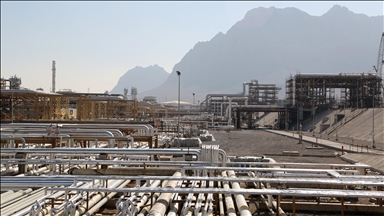
ANKARA
OPEC has decided not to reduce oil production from now through the first half of 2015.
The price of oil hit a four-year low within minutes of the announcement after the OPEC meeting in Vienna on Thursday.
The price of Brent crude dropped to $76.48 a barrel – a four-year low – while West Texas Intermediate fell to $72.69.
OPEC officials announced the decision after five hours of discussion at the cartel's Vienna conference on Thursday.
"We are going to produce 30 million barrels per day for the first half of 2015," said Abdalla Salem el-Badri, Secretary-General of OPEC, in a live webcast on OPEC's website.
"We will see how the market reacts to this 30 million, and we will follow it accordingly," he added.
Crude oil prices have plunged 30 percent since June, from $115 per barrel to below the $80 mark in November.
But oil producers like Saudi Arabia, Kuwait and Iraq came out against production cuts before the meeting, as they are more concerned about preserving their market share.
Other members of the cartel, such as Venezuela, would like to cut production in the hope of raising the price. These nations need to keep the price above $80 a barrel to balance their national budgets.
But OPEC came out instead against the cuts. "Our member countries accommodate their budgets to the income they are getting," said el-Badri.
"We don't have a maximum or minimum price target," he added.
OPEC projections
"Although world oil demand is forecast to increase during the year 2015, this will, yet again, be offset by the projected increase of 1.36 million barrels per day in non-OPEC supply," OPEC spokesman Hasan A. Hafidh Hamid said.
The U.S. and Canada have significantly increased their production volumes since 2008.
U.S. crude oil production rose from five to 7.4 million barrels per day between 2008 and 2013, according to the U.S. Energy Information Administration.
Crude oil production in Canada increased from 2.6 to 3.3 million barrels per day and Brazil's crude oil output has risen from 1.8 to two million barrels per day during the same period, according to the U.S. agency's website.
The decline in crude oil prices is the result of a combination of factors.
One factor is the rise in the value of the U.S. dollar: The price of oil is determined in dollars, and countries with a low exchange rate for the U.S. currency are finding oil purchases expensive.
The slow growth rate of Asian and European economies has decreased demand for oil from these regions.
And increasing domestic production of unconventional shale oil in the U.S. has reduced oil imports to that country.
Anadolu Agency website contains only a portion of the news stories offered to subscribers in the AA News Broadcasting System (HAS), and in summarized form. Please contact us for subscription options.







